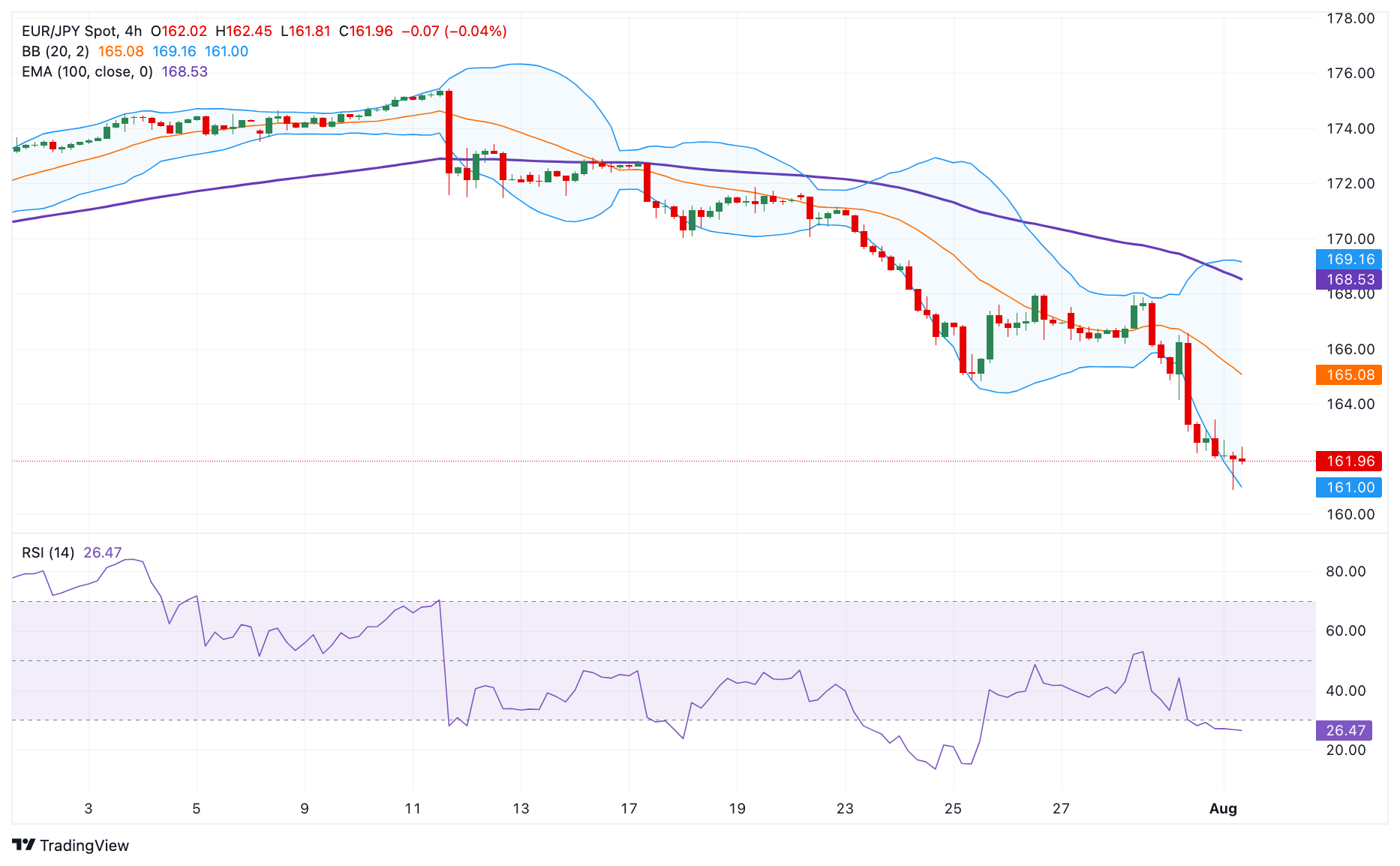- Analiza
- Novosti i instrumenti
- Vesti sa tržišta
- EUR/JPY Price Analysis: Remains under selling pressure below 162.50, oversold RSI condition eyed
EUR/JPY Price Analysis: Remains under selling pressure below 162.50, oversold RSI condition eyed
- EUR/JPY extends its downside near 162.25 in Thursday’s early European session.
- The cross is below the key 100-period EMA with an oversold RSI condition.
- The key support level is seen at the 162.00 psychological mark; the first upside barrier emerges at 164.85.
The EUR/JPY cross trades in negative territory for the fourth consecutive day around 162.25 on Thursday during the early European session. The Japanese Yen (JPY) gains momentum against the Euro (EUR), bolstered by a surprise hawkish policy announcement of the Bank of Japan (BoJ) on Wednesday.
The BoJ decided to raise its short-term policy rate to 0.25% from 0-0.1%, the largest since 2008. Additionally, the Japanese central bank stated that it will taper the Japanese government bonds to about 3 trillion yen ($19.64 billion) per month in the January to March 2026 quarter.
EUR/JPY keeps the bearish vibe unchanged on the 4-hour chart as it holds below the key 100-period Exponential Moving Average (EMA). The Relative Strength Index (RSI) holds in bearish territory below the midline. However, the oversold RSI condition indicates that further consolidation cannot be ruled out before positioning for any near-term EUR/JPY depreciation.
The crucial support level for the cross will emerge at the 162.00 psychological mark. Extended losses will see a drop to the 161.00-161.10 region, portraying the lower limit of the Bollinger Band and round figure. The additional downside filter to watch is 160.22, a low of March 11.
On the upside, the immediate resistance level for the cross is seen near 164.85, a low of July 25. Further north, the next hurdle is located at 167.88, a high of July 30. Any follow-through buying above this level could expose the 100-period EMA at 168.55, followed by the upper boundary of the Bollinger Band around 169.12.
EUR/JPY 4-hour chart
Japanese Yen FAQs
The Japanese Yen (JPY) is one of the world’s most traded currencies. Its value is broadly determined by the performance of the Japanese economy, but more specifically by the Bank of Japan’s policy, the differential between Japanese and US bond yields, or risk sentiment among traders, among other factors.
One of the Bank of Japan’s mandates is currency control, so its moves are key for the Yen. The BoJ has directly intervened in currency markets sometimes, generally to lower the value of the Yen, although it refrains from doing it often due to political concerns of its main trading partners. The current BoJ ultra-loose monetary policy, based on massive stimulus to the economy, has caused the Yen to depreciate against its main currency peers. This process has exacerbated more recently due to an increasing policy divergence between the Bank of Japan and other main central banks, which have opted to increase interest rates sharply to fight decades-high levels of inflation.
The BoJ’s stance of sticking to ultra-loose monetary policy has led to a widening policy divergence with other central banks, particularly with the US Federal Reserve. This supports a widening of the differential between the 10-year US and Japanese bonds, which favors the US Dollar against the Japanese Yen.
The Japanese Yen is often seen as a safe-haven investment. This means that in times of market stress, investors are more likely to put their money in the Japanese currency due to its supposed reliability and stability. Turbulent times are likely to strengthen the Yen’s value against other currencies seen as more risky to invest in.
© 2000-2026. Sva prava zaštićena.
Sajt je vlasništvo kompanije Teletrade D.J. LLC 2351 LLC 2022 (Euro House, Richmond Hill Road, Kingstown, VC0100, St. Vincent and the Grenadines).
Svi podaci koji se nalaze na sajtu ne predstavljaju osnovu za donošenje investicionih odluka, već su informativnog karaktera.
The company does not serve or provide services to customers who are residents of the US, Canada, Iran, The Democratic People's Republic of Korea, Yemen and FATF blacklisted countries.
Izvršenje trgovinskih operacija sa finansijskim instrumentima upotrebom marginalne trgovine pruža velike mogućnosti i omogućava investitorima ostvarivanje visokih prihoda. Međutim, takav vid trgovine povezan je sa potencijalno visokim nivoom rizika od gubitka sredstava. Проведение торговых операций на финанcовых рынках c маржинальными финанcовыми инcтрументами открывает широкие возможноcти, и позволяет инвеcторам, готовым пойти на риcк, получать выcокую прибыль, но при этом неcет в cебе потенциально выcокий уровень риcка получения убытков. Iz tog razloga je pre započinjanja trgovine potrebno odlučiti o izboru odgovarajuće investicione strategije, uzimajući u obzir raspoložive resurse.
Upotreba informacija: U slučaju potpunog ili delimičnog preuzimanja i daljeg korišćenja materijala koji se nalazi na sajtu, potrebno je navesti link odgovarajuće stranice na sajtu kompanije TeleTrade-a kao izvora informacija. Upotreba materijala na internetu mora biti praćena hiper linkom do web stranice teletrade.org. Automatski uvoz materijala i informacija sa stranice je zabranjen.
Ako imate bilo kakvih pitanja, obratite nam se pr@teletrade.global.
















